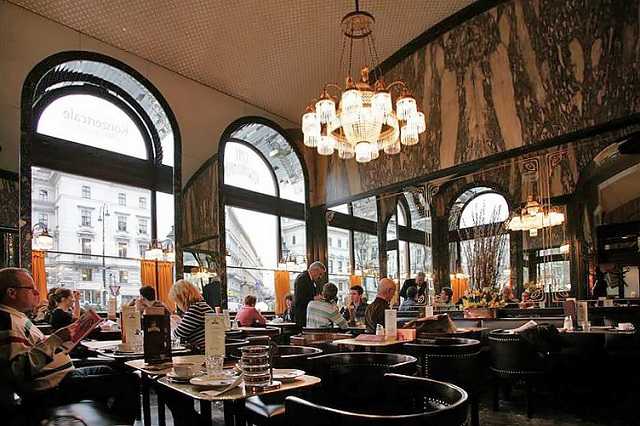VIENNA, Austria – Vienna Tourist Board showcased how its coffeehouse culture contributes to the city’s quality of life at the ‘Sip of Vienna’ barista masterclass hosted in collaboration with Julius Meinl in Dubai. The Masterclass experience included a tasting session and a discussion about the process of selecting and roasting green coffee beans as part of the learning experience.
The highly trained baristas at Julius Meinl demonstrated how to prepare the “Wiener Melange”, a typical Viennese coffee speciality and showcased how to grind the beans, measure, and brew coffee using a variety of different methods.
With around 2,200 coffeehouses in Vienna, ranging from elegant traditional cafés to simple bistros with standing room, from spacious café-restaurants to cosy café-patisseries, the Viennese coffeehouse culture inspires artists and guests. As a result of Vienna’s coffeehouse culture fulfilling an invaluable social function, UNESCO added it to its Intangible Cultural Heritage list in 2011.
Throughout Vienna, people meet in coffeehouses to philosophize, relax, meditate, read the newspaper, gossip, flirt, play billiards and chess, and talk with friends and strangers.
Matthias Schwindl, Media Relations Manager Middle East at Vienna Tourist Board, said: “The Viennese coffee house is known around the globe for its informal pleasantness, as an oasis of gemütlichkeit. Gugelhupf, Sachertorte, and many other tarts and cakes seduce with the promise of sweet pleasure.
Vienna embraces international coffee trends like different flavour profiles and new and old preparation methods, from cold brew to drip filter, while incorporating sustainability, natural purity, fair trade, and direct trade.”
During the event, Vienna Tourist Board also showcased the reasons why Vienna has the highest quality of life in the world.
Schwindl added: “Viennese coffeehouse culture plays a significant role in enhancing the city’s liveability factor. We are proud to be named the world’s most liveable city for the third time in the past five years. Providing employment opportunities, encapsulating and reflecting the local character, and making the city vibrant, coffeehouse culture is a fundamental component of our city’s culture. In addition to being places of leisure and work, they foster connections and empower communities.”
Vienna’s coffee culture and quality of life are heavily influenced by the purity of water supplied in the city. The Viennese water originates from the Lower Austrian-Styrian Alps and flows directly to the capital via a pair of Mountain Spring Pipelines.
The First Vienna Mountain Spring Pipeline was inaugurated in 1873 – the year of the Vienna World’s Fair – with the aim of giving the population access to safe, fresh drinking water.The customary glass of water provided by coffeehouses with every coffee order is a testament to this. Coffeehouses offered a glass of water so customers could put their spoons down after stirring their coffee. As time went on, the glass of water was used to showcase the quality of the water used to make coffee.
The “Global Liveability Index” ranking of the “Economist Intelligence Unit” (EIU) has chosen Vienna as the world’s most livable city for the third time in 2022, with Vienna voted into first place in 2019 and 2018. In addition to criteria such as healthcare, education, infrastructure, and culture, Vienna scored particularly well in the areas of safety and stability.
The city was also listed as the most liveable city for the tenth time in a row by Mercer’s international comparative study. The survey compares political, social, and economic climate, medical care, education, and infrastructures such as public transportation, power, and water supply. It also considers restaurants, theatres, cinemas, sports facilities, consumer goods, nature, and environmental conditions. Vienna scored highly for its excellent medical care service and range of cultural and leisure activities as well as its excellent medical care service.
The Vienna Tourist Board is dedicated to maintaining and promoting the heritage and traditions of Vienna’s coffeehouse culture since it plays such a vital role in enhancing the liveability aspect of the city along with the countless other things the city has to offer.















